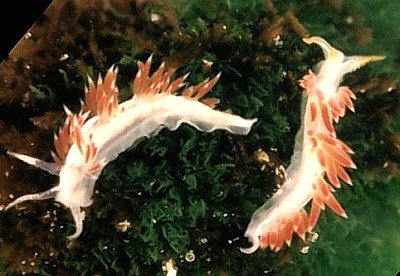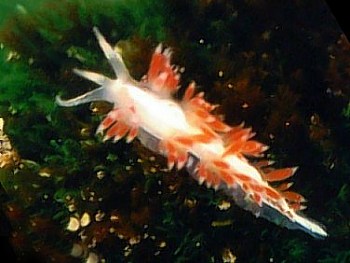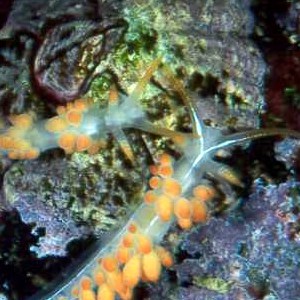More observations on Flabellina trilineata
June 26, 2000
From: Jeff Goddard


Hi Bill,
Bruce Wight may indeed have found a new color form of Flabellina trilineata. I have checked a bunch of references (including O'Donoghue's papers and original description of F. trilineata, Marcus (1961), MacFarland (1966), McDonald & Nybakken (1980), McDonald (1983), Behrens (1991), the papers of Jim Lance and Joan Steinberg, and most of the annotated species lists from the northeastern Pacific) and can not find any mention of individuals of this species lacking white lines. The lines are sometimes faint, but I have never seen F. trilineata without them. Most of my work, however, has been in the intertidal from central California to Washington. Perhaps we can get some feedback on this color form from other workers in the region (I will pass this message along to Terry Gosliner, Dave and Mike Behrens, Hans Bertsch, Gary McDonald and Sandra Millen).
The unlined specimens in Bruce Wight's beautiful photos do look like Flabellina trilineata to me, especially in the length and taper of the rhinophores and cephalic tentacles, and the fusiform shape of the cerata. However, to be certain about their identity, we need to know if the rhinophores are annulate or smooth. If the latter, then those specimens could be Catriona rickettsi Behrens, 1984, which can look much like unlined F. trilineata. I have found both species in abundance together on the same patches of the hydroid Tubularia sp. on the south jetty of the Umpqua River, Oregon.
Since we are on the subject of lookalikes of Flabellina trilineata, here are two photos of F. bertschi Gosliner & Kuzirian, 1990. In the UPPER photo the aeolid on the right is F. trilineata [note the lamellate rhinophores]. I found these aeolids together in a mid intertidal pool at Punta San Andrés (28o 42.50' N, 114o 18.07' W) on the west coast of Baja California just this past March. At first glance I thought I was seeing 14 specimens of F. trilineata. Closer inspection, however, revealed two of the 14 to have a broad white swath on the notum and smooth rhinophores, instead of the three white lines and annulate rhinophores of F. trilineata.
Best wishes,
Jeff
goddard@lifesci.ucsb.edu
Goddard, J., 2000 (Jun 26) More observations on Flabellina trilineata. [Message in] Sea Slug Forum. Australian Museum, Sydney. Available from http://www.seaslugforum.net/find/2619
Dear Jeff,
Here is a closeup of part of Bruce Wight's photo. It seems to show that the rhinophores in the unlined form are lamellated as in 'typical' animals, but I will ask Bruce if he has a clearer photo of the rhinophores.
Best wishes,
Bill Rudman.
Related messages
-
Growth on Flabellina trilineata from California
From: John Yasaki, May 8, 2009 -
Re: Flabellina trilineata from California
From: Clinton Bauder, August 5, 2006 -
Flabellina trilineata from California
From: Aidan Hampson, July 6, 2006 -
Flabellina trilineata feeding
From: James Lyle, August 1, 2005 -
Flabellina trilineata? from California
From: Denise Weisman, June 3, 2005 -
Flabellina trilineata juveniles
From: Sean Kearney, March 23, 2004 -
Flabellina trilineata laying eggs
From: Bruce Wight , August 4, 2003 -
Flabellina trilineata from British Columbia
From: Clinton Bauder, January 21, 2003 -
Flabellina trilineata from San Miguel, Calif.
From: Bruce Wight, August 12, 2002 -
Flabellina trilineata from Canada
From: Marli Wakeling, December 19, 2000 -
Re: Flabellina trilineata rhinophores
From: Bruce Wight, June 30, 2000 -
Re: Flabellina trilineata
From: Bruce Wight, June 27, 2000 -
Flabellina trilineata and its amphipod crustacean mimic
From: Jeff Goddard, June 23, 2000 -
Observations on Flabellina trilineata
From: Bruce Wight, June 23, 2000
